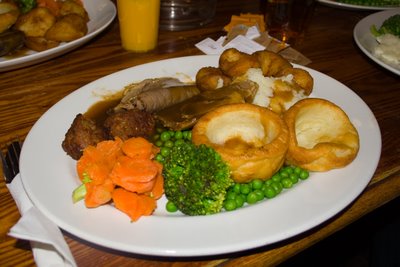
Today we had a typical Sunday roast dinner in a local pub. If there'’s one thing you can count on eating on a Sunday in most pubs and homes it'’s a Sunday roast dinner. Fish and chips aside, this is probably the most popular of all British meals. It consists of roasted meat (typically beef, pork, lamb, chicken, duck, turkey or ham), served with an assortment of boiled and roasted vegetables (roast potatoes, parsnips, peas, Brussels sprouts, carrots, broccoli), Yorkshire pudding, gravy and relishes horseradish sauce or English mustard with beef, mint sauce or redcurrant jelly with lamb, apple sauce with pork, cranberry sauce with turkey). Sage and onion stuffing is also common. We had our Sunday roast at one of the many Weatherspoon pubs, a chain of pubs that have sprung up all over the country. The cost, including a pint of beer, was just £4.99 each. You can'’t beat that!

